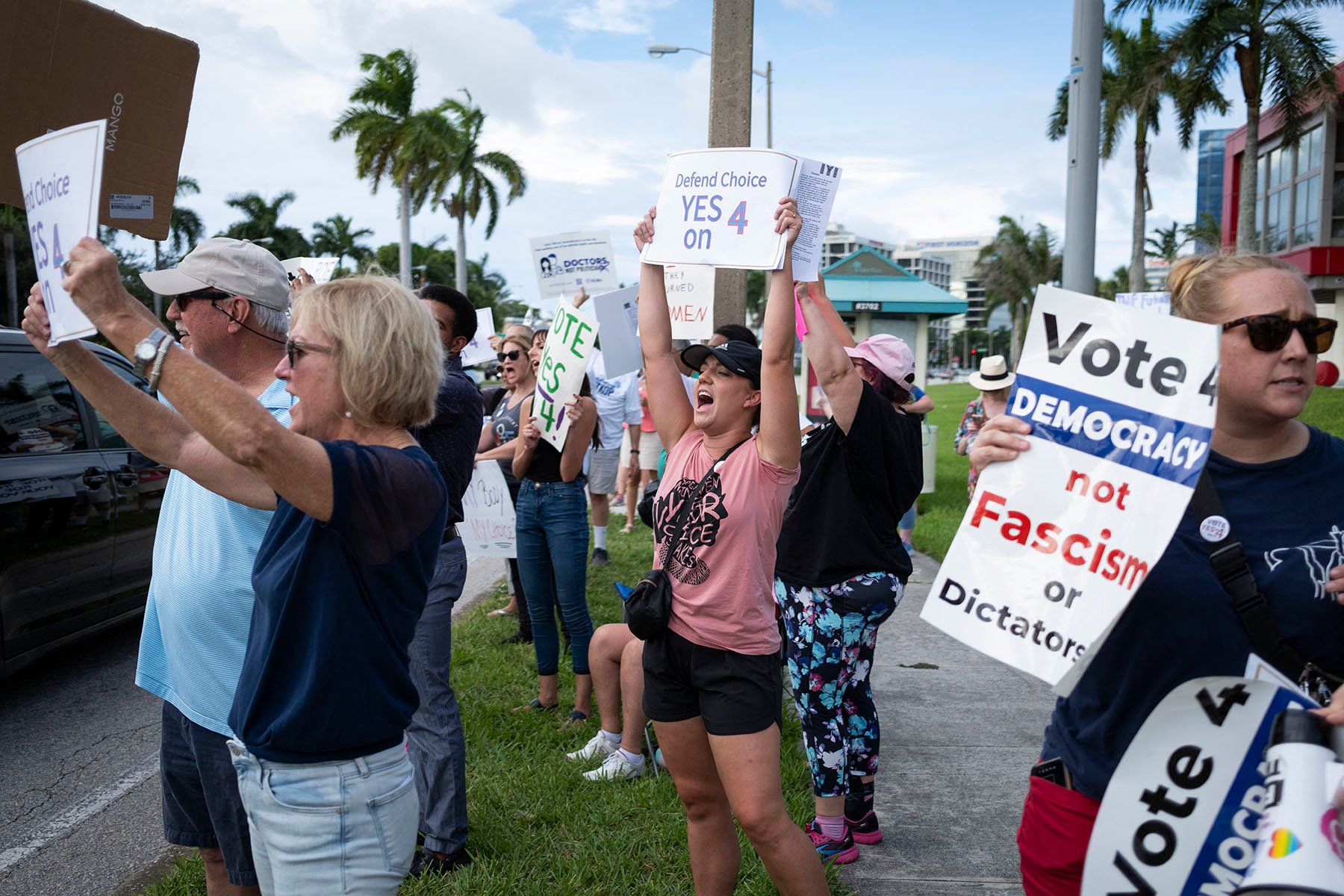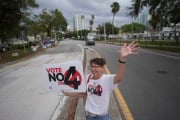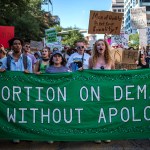Your trusted source for contextualizing abortion and Election 2024 news. Sign up for our daily newsletter.
PORT ST. LUCIE, Fla. — On a hot Saturday afternoon in October, Shauna Nobile and her two young children, Miles and Ruby, went out to canvass in this South Florida city for a constitutional amendment that would create a right to abortion in the state.
The three of them, all seasoned canvassers, have knocked on doors for their local county Democratic Party this year. But Saturday was their first time canvassing on behalf of the ballot measure campaign, targeting voters who had requested mail-in ballots.
Of the voters who answered the doors, some were enthusiastically behind the amendment. Others weren’t initially familiar with it but were supportive when Nobile told them the measure, Amendment 4, would overturn the state’s six-week abortion ban.
“This is the first season we’ve canvassed since COVID,” said Nobile, who works in education. “Pre-COVID, I remember we were super proud of ourselves when we knocked on lots of doors and our county turned purple.”
It’s canvassers like Nobile and areas like St. Lucie County, a swing area that backed former President Donald Trump by 1.5 points in 2020, that will determine the fate of the ballot measure that would restore abortion access in Florida.
-
Election Results:
“Florida is the third-largest state in the nation, and we are incredibly geographically isolated,” said Lauren Brenzel, Yes on 4’s campaign director. “Our state is surrounded almost entirely by water. So it is an incredibly dangerous situation that women in Florida are in when they’re trying to seek medical care right now. We need the nation’s eyes on Florida, because this is truly a fight for the dignity of Floridians.”
Since the Supreme Court overturned Roe v. Wade and sent abortion back to the states in Dobbs v. Jackson Women’s Health Organization, voters in red and blue states alike have voted to protect abortion rights on the ballot. Voters in 10 more states will vote directly on abortion in November.
But out of all those states, Florida is the only one where a 60 percent supermajority is required to pass a constitutional amendment. That threshold presents a unique and singular challenge for abortion rights advocates, who view the initiative as their only chance to overturn a strict ban in a state with a Republican-dominated legislature.
“I think this is ours to win. I think it’s been ours to win from the get-go,” said Anna Hochkammer, executive director of the Florida Women’s Freedom Coalition and one of the architects of Amendment 4. “Floridians in general are suspicious of abortion bans. They don’t like them. There tends to be a fairly libertarian bent to the Florida voter consciousness, and I think the abortion bans violate them quite profoundly.”
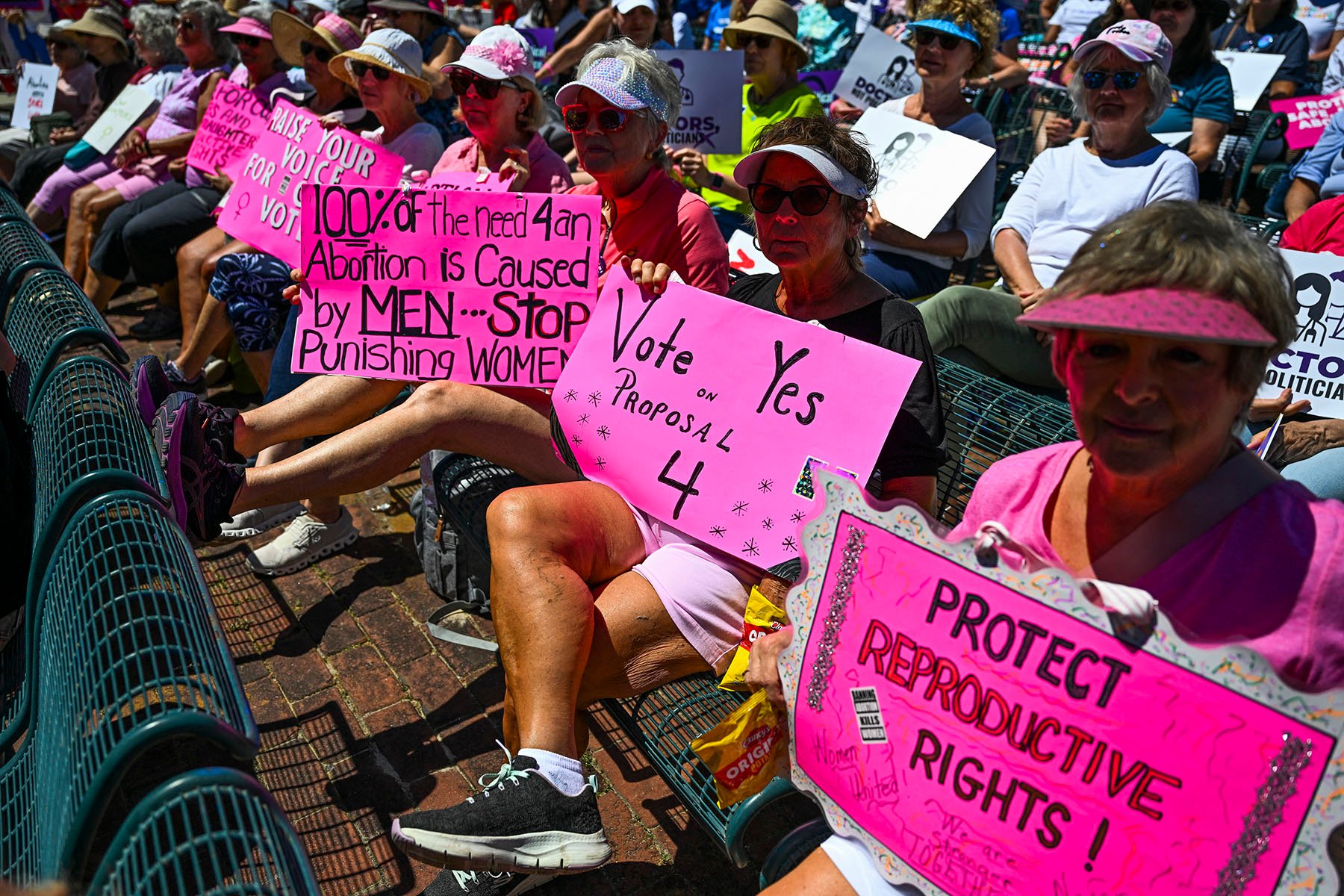
The stakes are equally high for anti-abortion advocates, whose major victory in getting a six-week ban passed stands to be overturned less than a year after going into effect.
“This amendment is key and critical to the rest of the our years, because if this passes, this is not going to change in our lifetime,” said Bruce O’Donoghue, Florida Family Voice’s board chair, to the audience gathered at a Baptist church in the Panhandle city of Pensacola. “It’s not going to happen.”
He spoke at a stop of a bus tour conducted by No On 4, a group opposing the amendment.
“We’re blessed that we have that 60 percent threshold some states don’t have. But this is something that, right now today, is holding in that 58 to 62 percent group,” Erik Dellenback, the liaison to faith and community in Republican Gov. Ron DeSantis’ office, said in Pensacola. “We cannot back off between now and November 5. It is a bad amendment and erases one of the most pro-life states.”
Florida, with its relatively robust infrastructure of clinics, has long been considered an abortion haven for patients in the South. Even after a 15-week abortion ban went into effect in 2022, Florida clinics were still taking in patients from Southern states that had banned or heavily restricted the procedure.
But that changed this year when abortion became banned after six weeks, measured from a patient’s last menstrual period — before many people know they’re pregnant. The law makes exceptions for cases of rape, incest and human trafficking, but Florida doctors argue those are unworkable in practice because of the law’s requirement that survivors report to law enforcement. Clinics and abortion funds are now focused on sending patients who don’t make the six-week mark out of state.
Data from Florida’s Agency for Health Care Administration (ACHA) showed that in the first eight months of 2024, abortions fell by almost 13 percent compared with the same period in 2023. Planned Parenthood health centers, which account for about a third of abortion providers in the state, have seen a 30 to 40 percent reduction in abortions under the six-week ban, said Laura Goodhue, the executive director of the Florida Alliance of Planned Parenthood Advocates.
Jessica Hatem, the executive director of Emergency Medical Assistance, an abortion fund based in West Palm Beach, said her case load has been “heavy” since May.
The bans are intentionally vague, she said, “and it creates a lot of confusion for people. So people don’t know what help is out there for them. People don’t know if they are kind of caught in this net of problems, or if they can be the exception to this.”
Goodhue is no stranger to legislative battles over abortion policy and hard-fought ballot initiative campaigns in Florida. But Amendment 4 feels different. “I’m hopeful, but I’m nervous too, because 60 percent is scary,” she said in an interview at the Planned Parenthood health center in Port St. Lucie.
Polls show most Floridians support abortion being legal in most or all cases. But the ballot measure campaign is contending with two dueling challenges: uneven awareness about the state of abortion in Florida and the 60 percent requirement.
“The threshold for the no side is extremely low,” said Hochkammer. “They don’t even have to get close to winning, they just have to get to 40 percent.”
To hit 60 percent, the nonpartisan Yes on 4 campaign has “to be talking to everyone, everywhere, all at once,” Brenzel said. The campaign has attempted to contact over 1.1 million voters, with most of those attempts being at voters’ doors.
“We know that many people don’t know about Florida’s abortion ban,” Brenzel said. “They don’t know that the law has changed aggressively within the last two years.”
Like abortion ballot measures that have won in other states, Yes on 4 is framing the amendment as a matter of freedom and getting government interference out of personal decisions.
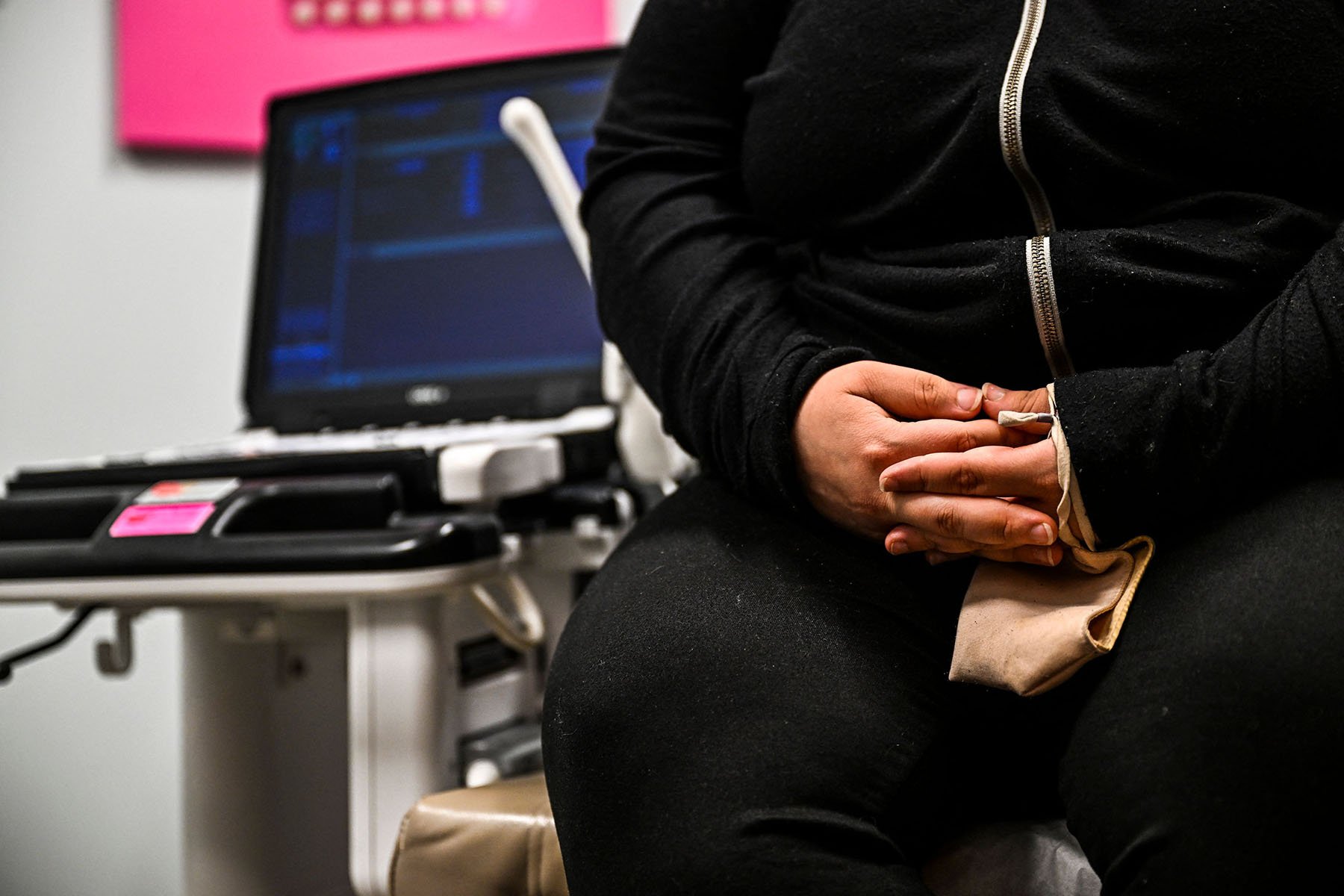
The campaign is heavily relying on personal stories and testimonials with television ads featuring doctors and patients talking directly about the impact of the ban. In speaking with reporters, Brenzel frequently highlights stories of women like Anya Cook, who says she faced a life-threatening medical emergency losing a wanted pregnancy and Deborah Dorbert, whose infant son died 94 minutes after being born from fatal birth defects. Patients who receive fetal anomaly diagnoses and don’t qualify for an exception to the ban in Florida must either risk carrying nonviable pregnancies to term or travel out of state.
Abortion opponents argue Amendment 4 is so dangerously vague and poorly worded that even those who support abortion rights should oppose it because it would, they say, nullify reasonable regulations governing abortion and infringe on parents’ rights to be involved in their childrens’ health care. (The text of the amendment states that it would not invalidate Florida’s parental notification requirement for abortion.) But they also don’t agree that the current law constitutes a prohibitive ban.
“This is not a ban on abortion. Let me give you some numbers on this. And this doesn’t bring any joy,” Aaron DiPietro, legislative director of Florida Family Voice, said in recounting statistics on abortion in Florida. “That’s 54 percent of abortions in the state of Florida that occur before the Heartbeat Protection Act. So again, anyone that tells you that the heartbeat bill is a ban on abortion is lying to you.”
O’Donoghue agreed.
“I’ve got a wife, raised with two sisters, a mom, a lot of ladies in my life,” he told The 19th. “And, I can just share from my experience, I’m pretty sure, at about six weeks, you got a pretty good idea that, ‘I missed my menstrual period, I need to get this checked out.’”
The amendment’s opponents have a lower threshold to hit, but they’re facing a major cash disparity: Floridians Protecting Freedom, the main coalition behind the Amendment 4 campaign, has raised over $76 million, dwarfing what has been raised by anti-abortion groups. “We’ve got to multiply,” O’Donoghue said, invoking the Biblical story of Jesus feeding a crowd of 5,000 with five loaves of bread and two fish.
In addition to traditional grassroots organizing, the No On 4 campaign is tapping the power of Florida pastors and faith leaders, who speak to audiences every week and have deep ties in their communities.
“If the church shows up, it’s game over,” said Kevin Baird, director of Pastoral Ministries at Florida Family Voice. “And so we need to awaken the church in order to do what it always has done, and that is to be salt and light in this particular arena.”
Dellenback has been traveling across the state talking to pastors about Amendment 4 and encouraging them to speak about it to their congregations. The “anthem verse” of the amendment campaign, he said, is Hosea 4:6: “My people are destroyed for lack of knowledge.”
“What motivates me is I don’t want any faith leader in particular to wake up on November 6 and not have talked about it because they didn’t know,” Dellenback said. The difference between the current law and the amendment, he said, is “40,000 babies per year in the state of Florida.”
That framing resonates with Rob Brooks, a real estate agent who lives in Gulf Breeze and attended the Pensacola event. “I just want to protect the babies,” he said of his opposition to Amendment 4.
“I went to a university that had a stadium that seated 80,000,” he added. “When I understood that, I had a clear picture.”
Florida, a one-time battleground state, has shifted considerably more Republican in recent years. Per the most recent voter registration data, around 40 percent of voters in the state are registered Republicans, 32 percent are Democrats and 26 percent aren’t affiliated with a party.
The campaign’s path to victory, Hochkammer said, is “straightforward”: to surpass 60 percent, Amendment 4 needs support from 80 to 85 percent of registered Democrats, two-thirds of non-party-affiliated voters and 40 percent of Republicans.
Public polls from the last few months have shown that between 54 and 58 percent of voters support Amendment 4. A more recent survey from The New York Times and Siena College that marks a significant outlier from other Florida polls showed Amendment 4 in a more precarious position, with only 46 percent of likely voters supporting it and 38 percent opposed.
Anti-abortion groups have a “lot of advantages” in Florida due to the low threshold, Republicans’ growing registration edge and the fact that Trump is expected to carry Florida in the presidential race for a third time, said Andrew Shirvell, founder and executive director of Florida Voice for the Unborn.
The organization is conducting grassroots organizing in red-leaning counties focused on making sure that Trump supporters, like Trump, “hold the line” to vote no on the measure.
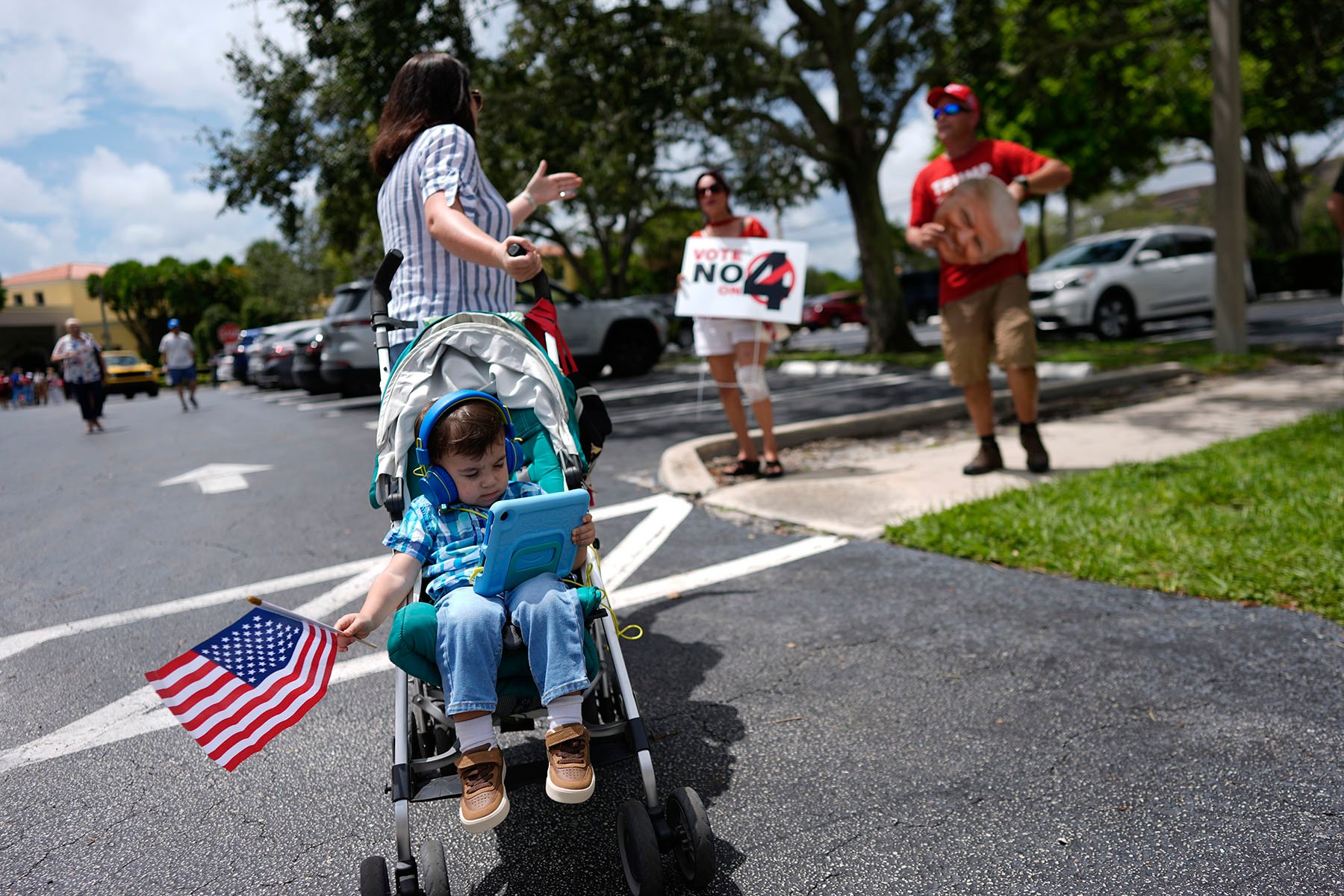
“This is a red state … and we feel very, very good about our chances of defeating Amendment 4,” he said. “Florida, I think, is going to shock the country on election night.”
Florida also stands out from other states with abortion ballot measures for the high barrier to entry for statewide campaigns — the state has over 13 million registered voters and includes multiple expensive media markets.
“The greatest issue Florida has is that it is ungodly expensive to run a campaign,” Hochkammer said.
Unlike the main Yes on 4 campaign, which is nonpartisan, the Florida Women’s Freedom Coalition has explicitly positioned itself as bipartisan, bringing Republicans and Democrats together to unite on the issue. Bipartisanship, she believes, will be “the difference between winning and losing” on Amendment 4.
“When you are in the midst of a hyper-partisan national election, refusing to engage the partisan nature of the political conversation around you at every single level actually limits your communication options and limits the sort of people and proxies that you can allow to carry your message for you,” she said.
And while self-identified Democrats overwhelmingly support abortion, many in Florida with liberal political leanings have felt more demoralized and disengaged as a result of their party’s yearslong losing streak in statewide races.
TJ Briskey, a paid canvasser for the campaign, has been doing get-out-the-vote in some of the heavily Latinx communities in the Democratic-leaning Palm Beach area. He went out on a Saturday evening in a diverse, working-class neighborhood of West Palm Beach with literature in English, Spanish and Haitian Creole.
“Regardless of your party and your language, you have the opportunity to vote on amendment number four,” he said. “We’re wanting to make sure that we are making sure that we can communicate that effectively.”
Briskey, 21, studies business management at Florida Atlantic University, where he leads the college Democrats. Knocking on doors is a way for him to directly connect with people and make a difference in a community where he feels many are politically checked out.
But there were signs throughout the neighborhood that voters were engaged.
Mark Hinz, whose front lawn was adorned with homemade yard signs supporting Vice President Kamala Harris and Amendment 4, said he and his wife are working with a political action committee to put up a billboard supporting the measure on the nearby interstate highway.
“It’s a hard choice for everybody,” he said. “There’s a lot of times when you have to make a choice that you don’t like, but you have to have the ability to make that choice.”
It’s also not a given that all self-identified Democrats and Harris supporters will back the abortion rights amendment, especially in South Florida, where retirees and snowbirds skew the electorate older.
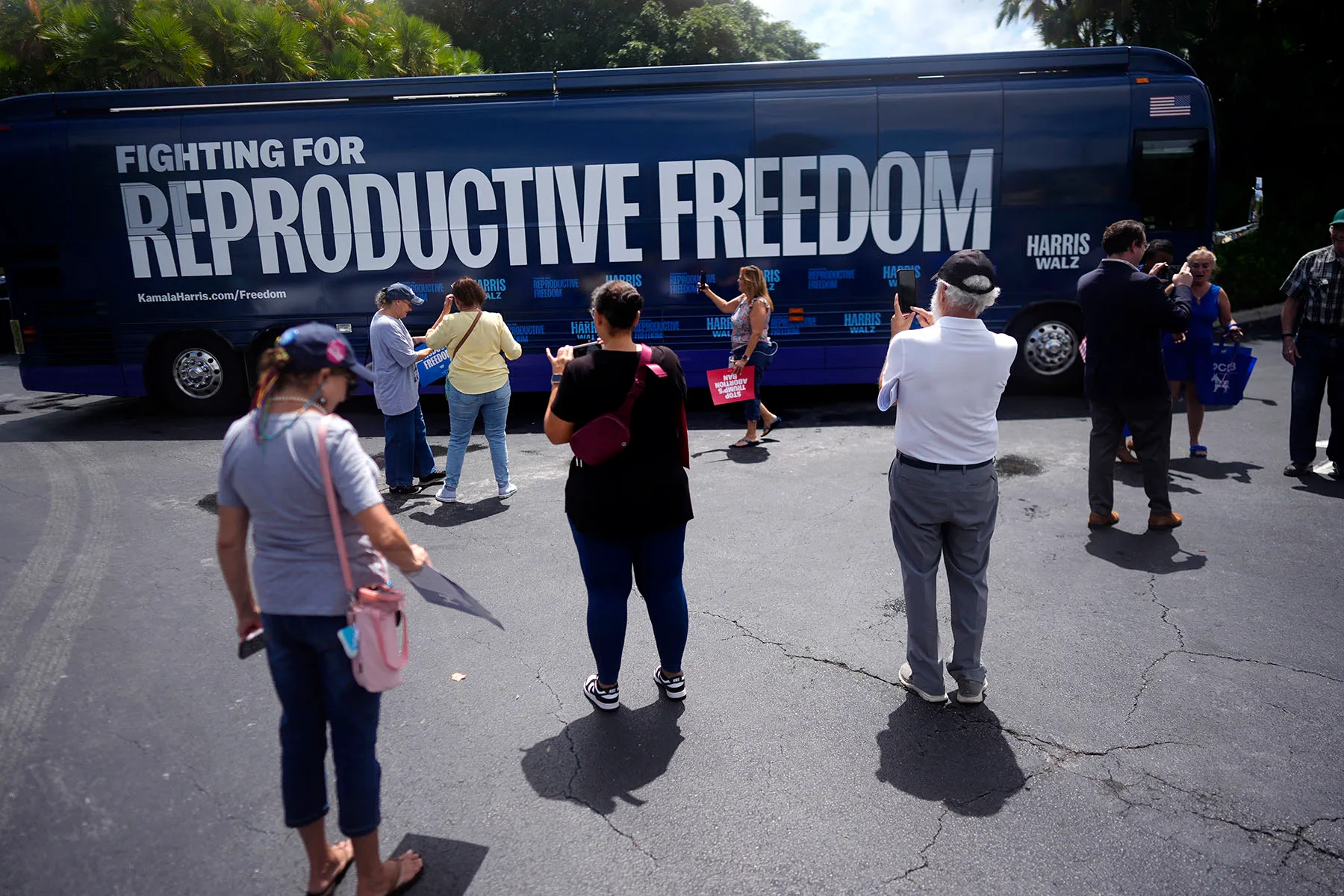
In Port St. Lucie, a woman who Nobile canvassed said she was excited to elect Harris to be the first woman president, but deciding to support the abortion amendment was more “difficult.”
“I don’t support abortion, but I do support women being able to save their lives. I think the cruelty of what’s happening to women who have no choice is simply not fair,” said the woman, who did not want her name published due to the divisive political climate surrounding the election.
“It’s a lot of mixed reactions, but the more doors you do, the more positive reactions you’re gonna get,” Briskey said. “I think people like what we’re doing. People like the fact that we’re coming to them and not waiting to find the information.”
Abortion losing on the ballot in Florida, Shirvell said, would provide a blueprint for how anti-abortion groups can defeat similar measures around the country. “If we lose all 10 states, including in Florida, we have a lot of soul searching to do as a pro-life movement,” he said.
Hochkammer believes the unpopularity of abortion bans and the campaign’s storytelling-focused strategy will sway voters into the yes column. But the 60 percent threshold in a state as vast and diverse as Florida looms over the campaign.
“It allows people to make that emotional and intellectual leap into the hypothetical. And when you can do that, people almost always end up supporting less government interference and more personal autonomy,” she said. “But this was never going to be easy, and it certainly hasn’t been. It’s a hard thing to do, and it’s a hard thing to do in 18 months.”
To check your voter registration status or to get more information about registering to vote, text 19thnews to 26797.
